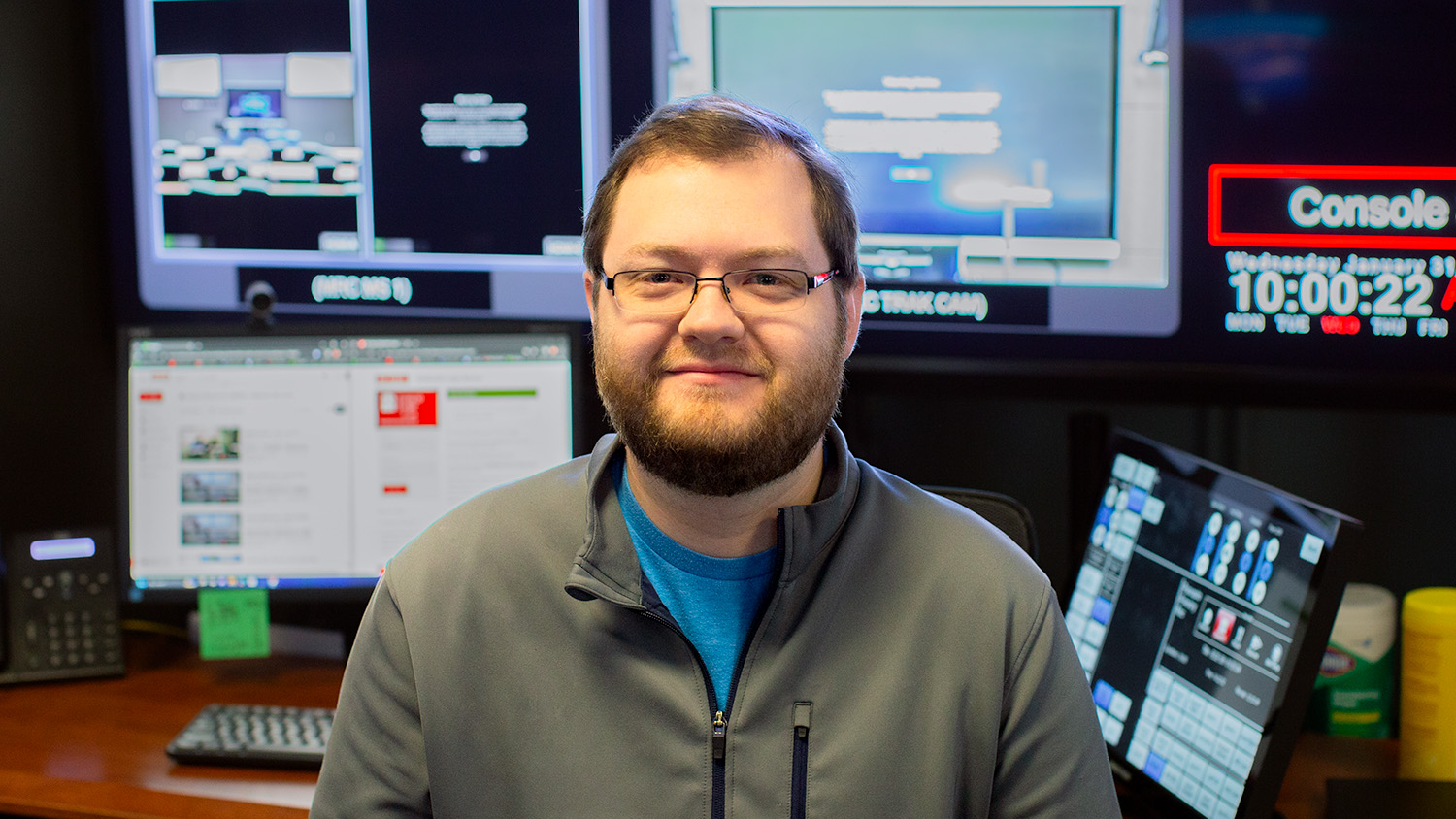Inside DELTA: 5 Questions with Bryan Aldridge

Bryan Aldridge, senior network and systems administrator for DELTA, has spent his entire career at NC State.
As an undergraduate student at NC State, Aldridge worked part-time for the State Climate Office of North Carolina, housed on Centennial Campus at NC State. After graduating with a degree in computer science, he was offered a full-time role as a systems administrator at the Climate Office.
In 2011, Aldridge joined the DELTA team in a similar position — building and maintaining the Linux environment.
“Fast forward over 10 years to now: my role has changed a little bit,” Aldridge said. “I still do occasional Linux administration with my team members, but today I mainly focus on improving and maintaining our network and storage infrastructure.”
Aldridge credits the healthy work-life balance, support and flexibility DELTA offers for keeping him at NC State for so long.
“There’s a strong emphasis on family and life outside of work, and there’s a lot of respect for that,” he said.
How would you describe your position to someone unfamiliar with DELTA?
As senior network and systems administrator, Aldridge ensures that all of DELTA’s IT infrastructure remains healthy so that the tools students, faculty, and staff depend on remain accessible.
“All of these tools have to live somewhere on some computing environment, and depending on which one you’re using, there’s a good chance that it’s on the platforms that we maintain,” he said.
For example, when a faculty member or student opens Wolfware or navigates to their Moodle course, they expect a satisfactory user experience that is reliable and performant.. Behind the scenes, Aldridge and the rest of his team are working to ensure that it happens every time.
“That’s a big part of our job: ensuring the overall health, reliability and performance of our systems,” he said.
What are your day-to-day responsibilities?
Aldridge’s first priority is to make sure there are not any items of serious concern that need his attention. For example, if there is an outage, it would be labeled a “severity one issue” that would need to be addressed immediately.
Otherwise, Aldridge’s day-to-day responsibilities consist of planning for upgrades, updating system software and researching different pathways for the future.
“Right now, we are looking at our storage,” Aldridge said. “We have been using a certain storage platform now for several years, and inevitably what happens is after a while the platform will cease to be supported.”
Aldridge has to spend time researching possible new directions and planning for the implementation to make the transition to a new platform as smooth as possible.
What is the most challenging aspect of your job?
The most important aspect of Aldridge’s job is to keep all of NC State’s learning tools fully operational and address any outages as soon as they happen.
“Sometimes it’s difficult to troubleshoot and to resolve issues while under stress, like when you’ve got a major outage that you’re having to deal with,” Aldridge said.
Additionally, it can be a challenge for Aldridge to track down the source of a performance issue with an application or service.
“These types of things can go on for days, weeks,” he said. “Sometimes you have to take a break from it and come back just to, you know, sort of recharge.”
What has been your favorite project that you have worked on?
Shortly after starting at DELTA, Aldridge began the process of virtualizing DELTA’s computing environment. Before this, most of DELTA’s servers were tied to a physical piece of hardware.
Virtualization allowed multiple servers to run on one piece of hardware. According to Aldridge, DELTA was previously limited to around 50 servers.
“Now we can have hundreds, thousands if we need it,” he said.
Another project that Aldridge worked on is a “restore tool” for Moodle. This allows DELTA’s LearnTech staff to access a copy of the Moodle environment from some time in the past
This is most often used when a user triggers an inadvertent action which results in the deletion of a course or a course item, such as an assignment or quiz. The restore tool allows them to go back to the previous version of their Moodle page where they can retrieve the deleted item.
“It has saved several faculty members from having to recreate things from scratch,” Aldridge said. “Initially, I didn’t realize how popular the tool would be, but it gets used quite a lot.”
What do you like to do outside of work?

Ever since he was a kid, Aldridge has loved to play the guitar. He sees it as a creative outlet and a de-stressor for him. He enjoys both electric and acoustic guitar and hopes to someday learn how to play bass.
“Every time I pick up the guitar, I feel like there’s something new that I haven’t previously discovered or played,” Aldridge said.
Although he mainly practices at home, Aldridge also serves on his church’s worship team as an electric and sometimes an acoustic guitarist. He has two daughters who have already shown interest in music and guitar.
Aldridge also enjoys playing tennis. In college, he was on the NC State club tennis team and has continued to play recreationally.
Today, Aldridge finds himself spending most of his free time alongside his wife and kids.
“Raising a family, while challenging, is a joy-filled responsibility and I’m thankful my colleagues are supportive of my role both inside and outside of DELTA,” he said.
- Categories:


